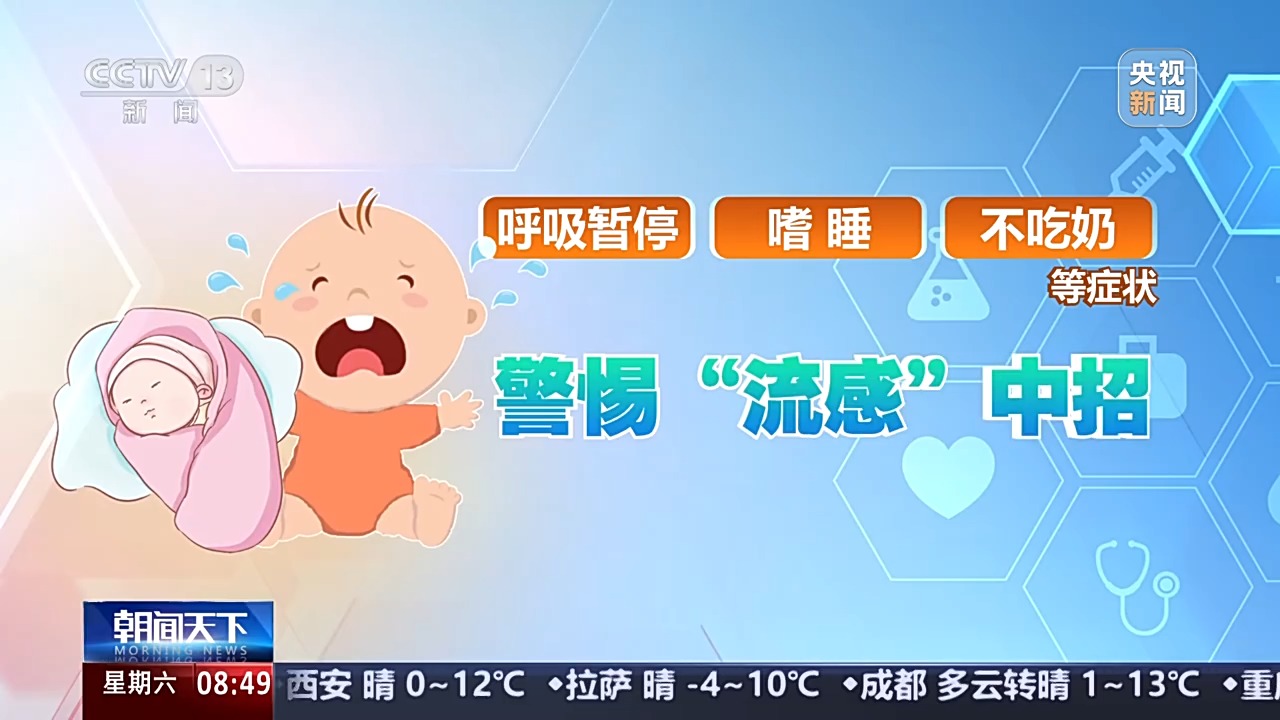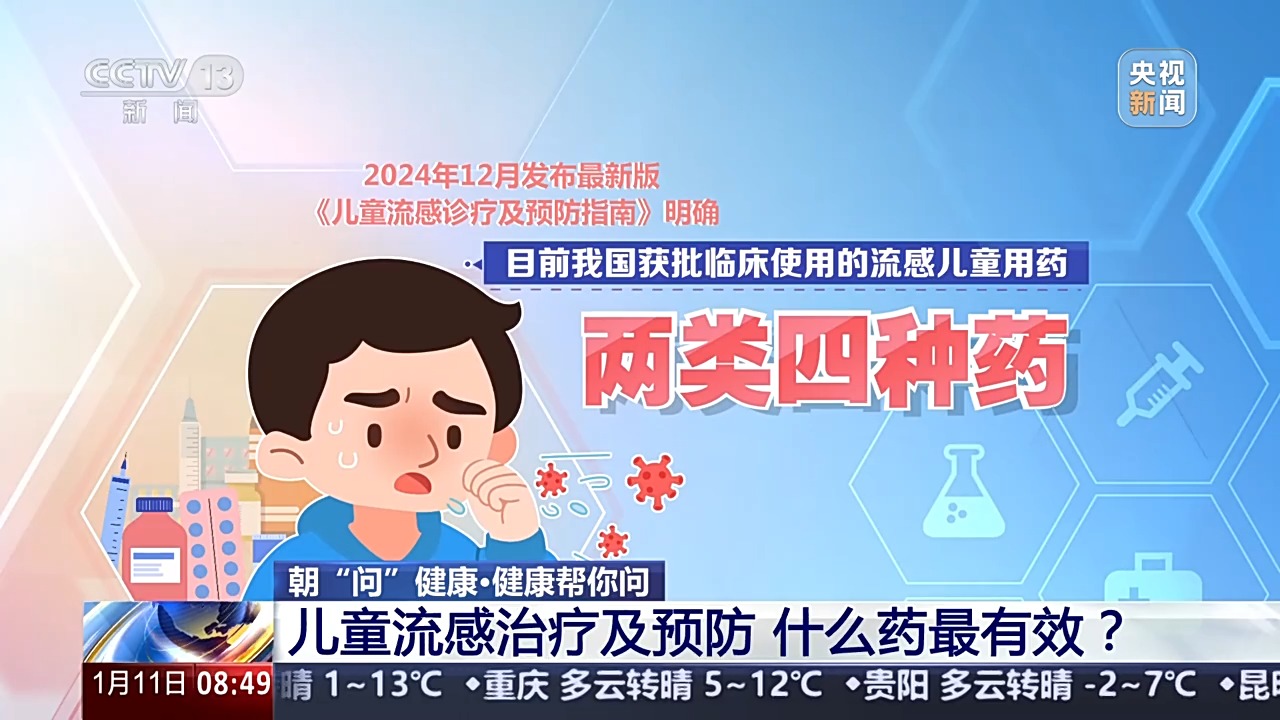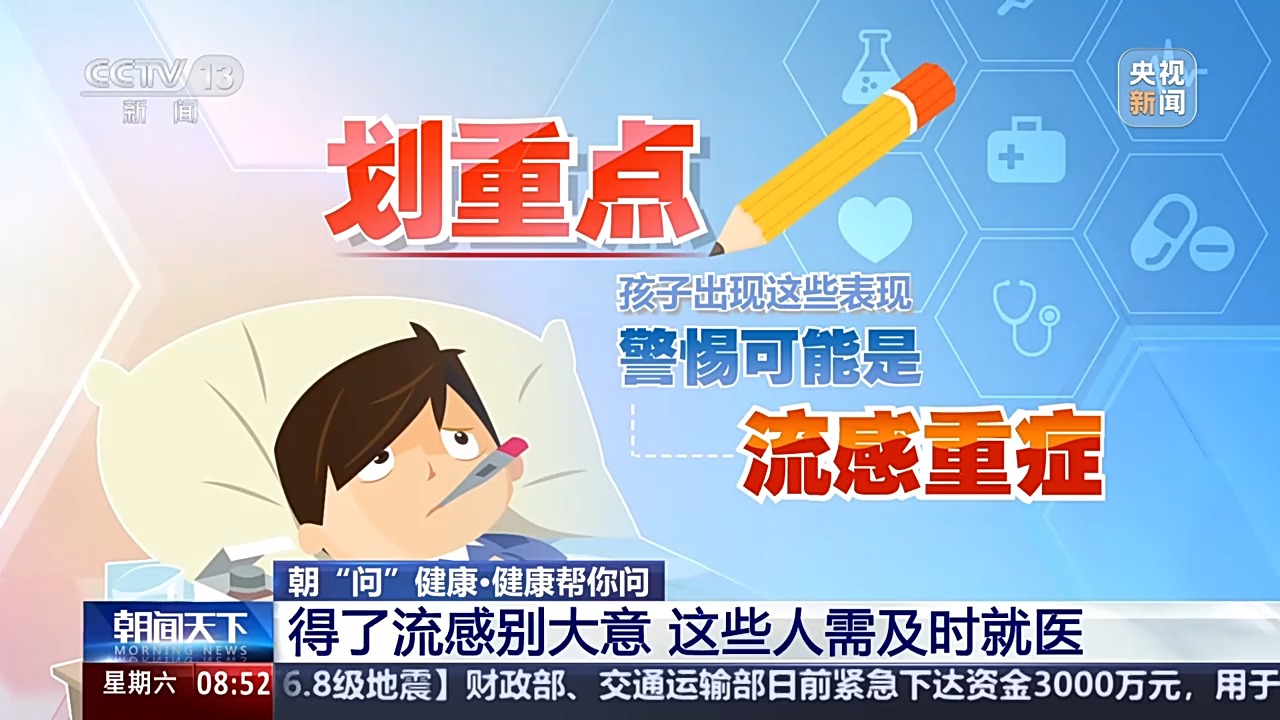The DPRK "asked" that the healthy flu has entered the epidemic peak. How can children prevent it? Understand in one article
Ask about health and pay attention to healthy life. Today we continue to talk about the topic of influenza. According to the surveillance of acute respiratory infectious diseases in the first week of 2025 released by China CDC, at present, the overall situation of acute respiratory infectious diseases continues to show an upward trend. Influenza is still in the seasonal epidemic period, and the positive rate of influenza-like cases in outpatient and emergency departments nationwide increased by 3.8% compared with last week, but it is still lower than the same period last year.
According to the monitoring and early warning information of local CDC, the level of influenza activity in many provinces in China is relatively high, and the number of influenza cases has increased significantly. Experts said,The flu has entered the epidemic peak this year.
Tong Zhaohui, director of Beijing Institute of Respiratory Diseases and vice president of Beijing Chaoyang Hospital affiliated to Capital Medical University:For example, Anhui has now entered the influenza peak, reaching level 4, and Jiangsu has also entered the influenza peak. The monitoring of Beijing Center for Disease Control and Prevention reached its peak in early January, so it should be said that the influenza monitoring has reached its peak from all over the country and the whole country.
How to distinguish between swine flu and common cold?
At present, influenza has entered the peak of epidemic. The full name of influenza is influenza, and influenza A is the main one at present. So, what’s the difference between swine flu and the common cold?
Tong Zhaohui, director of Beijing Institute of Respiratory Diseases and vice president of Beijing Chaoyang Hospital affiliated to Capital Medical University:Influenza is a serious symptom of the whole body, such as high fever, sore throat, and then sore muscles all over; The common cold is often that the body temperature will be lower, maybe 38℃ or even below 38℃. For example, the common cold is mainly "catarrh" symptoms, such as sneezing, runny nose, stuffy nose and local symptoms.
Do children have the same flu symptoms as adults?
Because children generally don’t describe how they feel when they are sick, every parent should be concerned about what kind of performance children will have when they are "recruited" by the flu season and how to treat them. We also ask experts to teach novice parents about science.
Xu Baoping, Director of the Respiratory Center Office of Beijing Children’s Hospital affiliated to Capital Medical University:Children’s digestive tract symptoms are relatively serious, such as nausea and vomiting, and some children may be the first symptoms, that is, nausea and vomiting first, rather than the respiratory symptoms of high fever and chills first.

The flu symptoms of newborns and infants are relatively atypical, and even their body temperature is not high. However, if there are symptoms such as apnea, lethargy, and not eating milk, you should also be alert to the "flu".
In the latest edition of "Guidelines for Diagnosis, Treatment and Prevention of Influenza in Children" released in December 2024, it is clear that there are only two types and four drugs approved for clinical use in China.

Xu Baoping, Director of the Respiratory Center Office of Beijing Children’s Hospital affiliated to Capital Medical University:Neuraminidase inhibitors, oseltamivir, zanamivir and palamivir, and RNA polymerase inhibitors, mabaloxavir, other drugs can not be used by children.

The drugs that children of all ages can use areOseltamivirPremature babies can also use it. In addition, other drugs have age restrictions, such asMabaloshaWeita isOver 5 years oldCan be used, likezanamivirIt is used fortreatWhen it comes to treating the flu, it isOver 7 years oldCan be used, butpreventWhen it isOver 5 years old.
In addition, some of these drugs are inhaled, and some are taken orally. Many of our children are calculated on the basis of kilograms of body weight, so the dosage of different kilograms of body weight is different.
Don’t be careless when you have the flu. These people need to see a doctor in time.
After getting the flu, many people think it’s better to take medicine at home instead of going to the hospital. Experts remind that not everyone is suitable for self-treatment. People with basic diseases, children with immune insufficiency, etc., once they get the flu, regardless of the symptoms, they need to pay special attention to timely medical treatment.
Tong Zhaohui, director of Beijing Institute of Respiratory Diseases and vice president of Beijing Chaoyang Hospital affiliated to Capital Medical University:For example, you are an older person with basic diseases, such as respiratory diseases, cardiovascular and cerebrovascular diseases, and even some immunosuppressants, such as tumor chemotherapy, because your immune function is low, and if you recruit a flu, it will easily make your immune function more attacked, then show high fever, and then some symptoms will come out, and even these people are prone to pneumonia. The immune function of children before the age of 12 is not perfect and has not been established. Once these children catch the flu, they make rapid progress and have high fever, and then they show urgency. Therefore, people like these two groups may need to go to the hospital in time, otherwise, once delayed, it may not be easy to treat later.
Here is also a special point for parents to draw:Once children have these manifestations, they should be alert that it may be a severe flu.

Xu Baoping, Director of the Respiratory Center Office of Beijing Children’s Hospital affiliated to Capital Medical University:The first is persistent high fever, the second is wheezing and dyspnea, and the third is manifestations outside the respiratory system, such as convulsions, sleepiness, oliguria, or particularly serious nausea and vomiting.
Can I get the flu vaccine once and for all?
Vaccination is the most effective and cost-effective way to prevent influenza, which can significantly reduce the probability of influenza and the risk of serious complications. Especially for pregnant women, children aged 6 months to 5 years, the elderly and high-risk groups with basic diseases, as well as medical workers, it is recommended to vaccinate against influenza once a year in autumn. So how does the flu vaccine work? Is it possible to get vaccinated once and for all?
Tong Zhaohui, director of Beijing Institute of Respiratory Diseases and vice president of Beijing Chaoyang Hospital affiliated to Capital Medical University:Influenza virus has a characteristic of constant variation, and influenza virus also has a large family with different strains, which may constantly produce new members, that is, new strains. Therefore, WHO will constantly update the recommended influenza vaccine strains, which is a process of scientific prediction or "scientific fortune telling". Generally speaking, influenza vaccines are well matched with influenza epidemic strains and have good protection. However, the prediction can not guarantee 100% accuracy, and there is also a mismatch between influenza vaccine strains and our epidemic strains, which affects the protection effect of our influenza vaccine.
In addition, after vaccination, we mainly prevent infection by producing antibodies. Antibodies are like soldiers who protect our bodies. Different vaccines can induce different antibodies and fight against different enemies. It takes time to assemble and train qualified soldiers. Our bodies need some time to produce enough antibodies. Generally, inactivated vaccines take 2 to 4 weeks, and live attenuated vaccines take 3 to 5 days. If we are attacked by the flu army before we produce enough antibodies, we will also be infected with the flu virus.

In addition, our antibodies also have the phenomenon of "retired". The antibody levels induced by various vaccines reached a peak one month after vaccination, and began to decline around three months. The antibody levels were higher after vaccination for six months than before, and decreased significantly after vaccination for one year.
When you enter the flu season, there will be many articles on social media and the Internet to teach you how to prevent or treat the flu. So are these statements correct? Can you tell the authenticity of these contents?
Is it reliable that "flu can be cured without taking medicine"?
Experts said that if there are some obvious aggravations or other infections in young people with good health, it is also recommended to seek medical treatment in time. It is not reliable to say that you can get well after a while.
Tong Zhaohui, director of Beijing Institute of Respiratory Diseases and vice president of Beijing Chaoyang Hospital affiliated to Capital Medical University:Young adults, for example, with persistent body temperature and cough and yellow phlegm, may also go to the hospital for treatment because of the increase of sputum volume and the change of sputum properties. Some will be combined with some other infections, including bacterial infections, and attention should also be paid at this time.
Can eating more foods containing vitamin C prevent the flu?
During the flu season, many people will eat more foods containing vitamin C such as oranges. Can this prevent the flu?

Xu Baoping, Director of the Respiratory Center Office of Beijing Children’s Hospital affiliated to Capital Medical University:Definitely not. Generally speaking, although vitamin C is an important nutrient, it is indispensable in our human body. If it is lacking, it is easy to get some diseases, but it is definitely ineffective in preventing and treating colds or flu.
Banlangen has a miraculous effect on preventing influenza, doesn’t it?
Many people think that Radix Isatidis can effectively prevent influenza. Is this really the case?

Tong Zhaohui, director of Beijing Institute of Respiratory Diseases and vice president of Beijing Chaoyang Hospital affiliated to Capital Medical University:In fact, traditional Chinese medicine, such as Radix Isatidis, and other drugs, do not inhibit virus replication, but actually play a role in clearing away heat and toxic materials and alleviating symptoms. But do you think it can inhibit virus replication? I think at least there is no evidence-based medical evidence at present.
(CCTV reporter Zhang Wei Shi Yingchun)